More Than a Place to Stay: My Homestay in Lombok
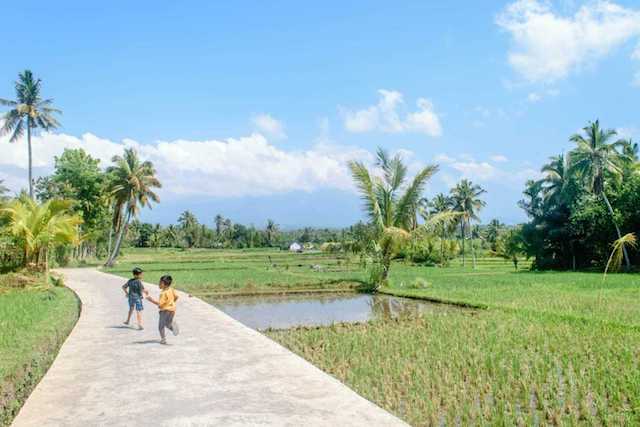
After spending some time on the increasingly touristy island of Bali, I made my way to a small village in Lombok, an island in Indonesia that I was visiting for the first time. The journey there reminded me of how different this island was to its neighbour. It was tame and impossibly green. In every direction, my view was crowded by palm trees, endless fields, rows of rice paddies, and mountains enveloped in dense trees. Monkeys sat undisturbed by the side of the winding roads, and the air was filled with the sounds of the call to prayer from surrounding mosques.
When my taxi stopped in the village, I was greeted by a man at the village’s entrance, and was quickly ushered in to sit down on the floor to an already prepared spread of tea and cakes. The man, my host for the next few days as a guest at Duara Travels’ Homestay in Lombok, introduced himself as Mohammed and pointed out his wife, Baiq, and adorable young son, Fairuz. The family spoke almost no English, so our initial introduction consisted of a lot of smiling, nodding, and awkward laughing.
I was the first tourist to visit Kedondong in a number of years, and I could see how important it was for them to present their lifestyle, culture, food, and holidays as authentically as possible.
Within minutes, the entire village caught wind of my arrival. One by one, more guests began crowding into the small sitting room. Every time a new guest entered the room, Mohammed introduced them. “This my brother,” he’d say. When a women came in, he’d cheerily point out “sister.” After this went on for a little while, I asked how many brothers and sisters he had. He pulled out his phone and on the calculator typed out the number ‘14.’ I looked around the small room, which by now had a crowd of at least 50 people of all ages, with more people clamoring for a glimpse just outside the door.
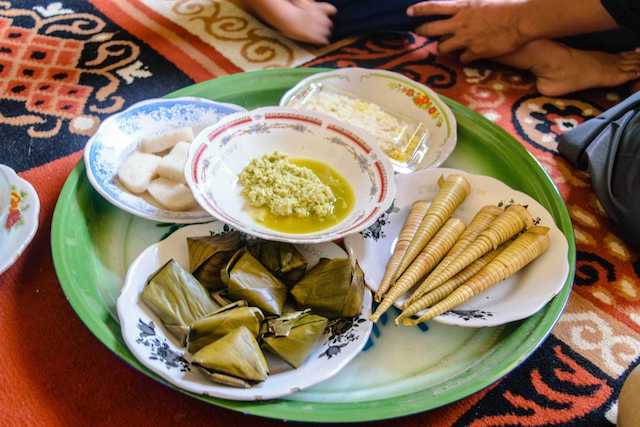
Mohammed tried to speak to me with the little English he had. He told me the village’s name, Kedondong, and then confirmed my suspicion that almost everyone here was family. From the crowd, someone pulled out a comically small children’s English book. It had a few basic words translated along with images. For the rest of the day, Mohammed clutched onto this book like it was sacred, and anytime I tried to ask him a question, he frantically flipped through the pages of photos of farm animals and kitchenware to try and offer me an acceptable answer in English.
I found the whole thing very endearing, and I didn’t have the heart to tell him that book wouldn’t be helpful to him unless he was in a first-grade classroom.
For me, this homestay in Lombok was a different travel experience, as I got to witness village life firsthand. However, for Mohammed and the rest of the village, it was a lot more.
The following day was a holiday, which explained the huge amount of food his wife was preparing in the kitchen next door. He asked me if I wanted to visit his mother and help her prepare some food, and I enthusiastically agreed. Her kitchen was a dark hut with almost nothing but a brick oven in the corner. Luckily, one of Mohammed’s many nieces, Epi, was home for the weekend from boarding school, and she spoke the best English of anyone in the village.
Her grandmother was preparing a basket of leaves and a huge bowl full of red stuffing when Epi told me that the food we’d be preparing was a traditional dish called bebetok. Bebetok is a traditional Lombok dish made of shredded coconut mixed with chili, wrapped in layers of leaves, then boiled for hours in a sauce made up of various herbs and spices, tamarind, sugar, and more fried coconut shavings. Mohammed’s mother showed me how to prepare the bebetok, but by the time I had managed to complete one, his mother had made about four.
“How many grandchildren does your grandmother have?” I asked Epi, which she translated for her grandmother. Her grandmother laughed.
“She says she doesn’t count anymore,” said Epi. There were children everywhere in the village, and if each one of them was a relative of Mohammed’s, then his mother must have dozens of grandchildren. The grandmother quickly reminded me of how my own used to be. It was clear that she was the matriarch of the family, who simultaneously seems to be everywhere at once, caring for countless grandchildren, and preparing a feast for an entire village without breaking a sweat.
Mohammed clutched onto this book like it was sacred, and anytime I tried to ask him a question, he frantically flipped through the pages of photos of farm animals and kitchenware to try and offer me an acceptable answer in English.
Once the bebetok were cooking, Epi took me to walk around the village with my growing fan club of village children in tow. We walked past houses where people sat outside and consistently tried to get me to stop for tea and food. We walked through rice fields where the children ran on the rows between the paddies with stunning accuracy and I wobbled slowly, trying my best not to fall into a rice paddy.
Here, there was quite literally a 0% chance of running into another tourist. It was nice to have the chance to get away from the growing crowds of Bali for a little while during this homestay in Lombok.
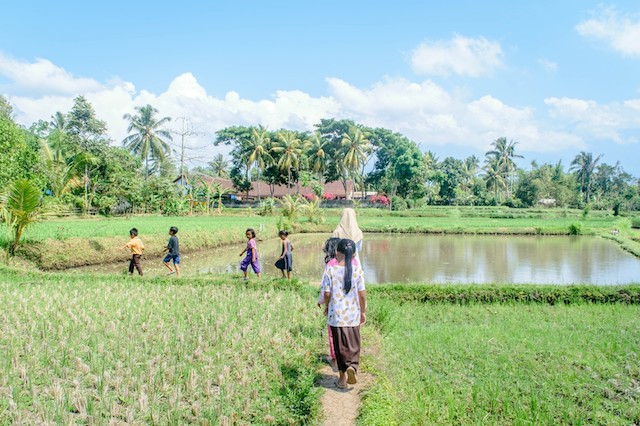
The following evening, we went to see the local Kedondong band practice for a wedding ceremony that would happen the next day. They played traditional boxed instruments called klentang. Each box has a different sized hole at the top, covered by an iron bar, that when hit, makes a high-pitched sound. There were maybe two dozen of them, each one played by someone else from the village, and when played together the sound was a beautiful symphony of clear sounds almost like bells.
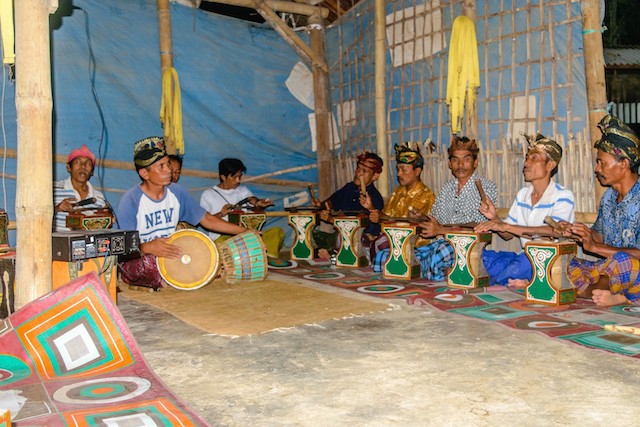
If I thought the band practice was impressive, I had no idea what was coming for the wedding the next day. One of the local women, Julia, brought me to the wedding and gave me a traditional sarong to wear so I would fit in (not likely, as I was the only foreigner at the wedding). Had no-one told me this was a wedding celebration, I would have thought it was a traditional parade. Thousands of locals crowded the sides of the roads to watch the procession go by.
More Than a Place to Stay: My Homestay in Lombok
People in colorful garments marched down the main road, playing big drums and the klentang from the night before. There were at least a dozen different bands, each playing to their own beat while performing a carefully orchestrated choreography. Julia explained to me that the bands were from different villages in the area, and that they always participate in wedding celebrations.
In a traditional Lombok wedding, the bride and her parade comes from one side of the road, and the groom from the other. They then meet in the middle and walk together to their marriage ceremony.
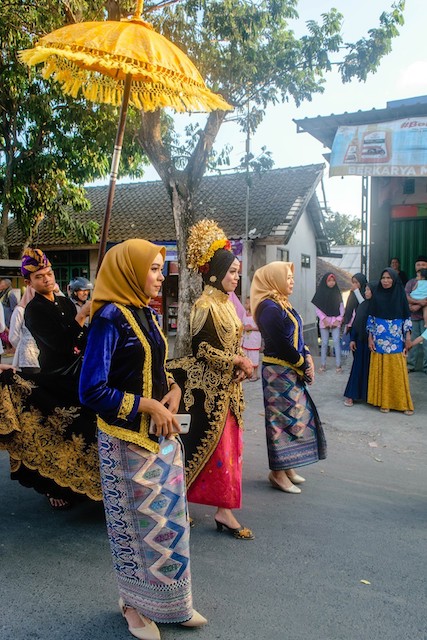
After the wedding, I retreated back to my host family, where they already had a large dinner tray waiting for me. Dinners with them were always interesting, since they constantly wanted to introduce me to their local food. In the few days I was with them, I tried different foods that I had never heard of before.
My favorite dish, aside from the bebetok, was a banana-heart stew we made for dinner.
My favorite dish, aside from the bebetok, was a banana-heart stew we made for dinner. Since my host family grew crops of bananas, there were always fresh bananas around. However, banana heart was something new to me. A banana heart is a red teardrop-shaped flower that grows at the end of a banana cluster. When you peel off the outer layers, the fleshy part on the inside can be eaten raw or cooked into stews or curries. It was delicious, and I was surprised to discover it has the texture of fish, but with a very neutral taste.
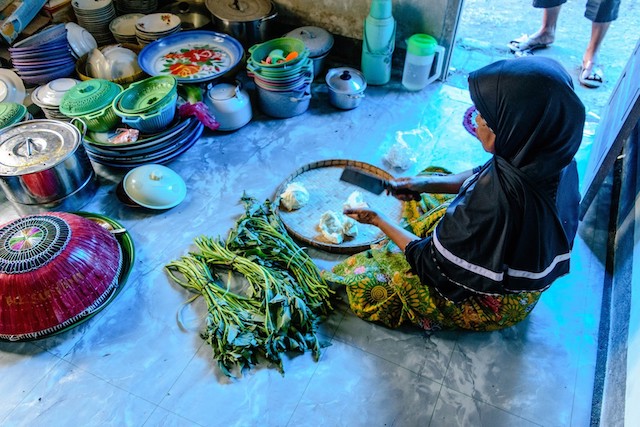
I was due to leave Kedondong the following morning, but I didn’t want to leave without visiting the school. The principal and Mohammed took me on a tour around the different classrooms so I could see how the children learned. In the earlier grades, they sang songs in the morning to learn their prayers. I noticed one of the classes, grade 6, was learning on tables outside, with nothing but a torn tarp hanging from the ceiling to protect the children from the elements.
When I asked why they were outside, the teacher took me to an empty classroom, where books lined broken shelves and deep cracks covered the walls. The classroom had been affected by the earthquake in 2018, as many houses in the village were, so the room was unsafe for children to learn in. It didn’t look like the children minded much though. They sat around their teacher with huge smiles on their faces and continued their school work.
For me, this homestay in Lombok was a different travel experience, as I got to witness village life firsthand.
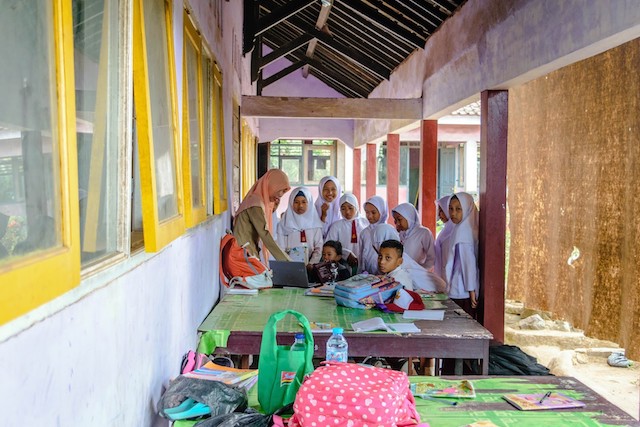
After visiting the school, it was time to say our reluctant goodbyes. People came out from all over the village to take last-minute photos with me. Mohammed pulled out his phone and translated, “We will miss you very much, Ms. Alicia.” I felt extremely humbled.
For me, this homestay in Lombok was a different travel experience, as I got to witness village life firsthand. However, for Mohammed and the rest of the village, it was a lot more. I was the first tourist to visit Kedondong in a number of years, and I could see how important it was for them to present their lifestyle, culture, food, and holidays as authentically as possible.
My stay in Kedondong through Duara Travels was a special one, unlike anything else I experienced during my month in Indonesia. Living with a host family gives you a different perspective on a destination that you simply don’t get by staying in hostels or hotels, or by joining tours. As a traveler, I always try to look forward to the road ahead instead of dwelling on places I’ve already been. However, I often find myself drifting off to thoughts of the silent village with its peaceful rice fields, smiley children, and my Lombok family.
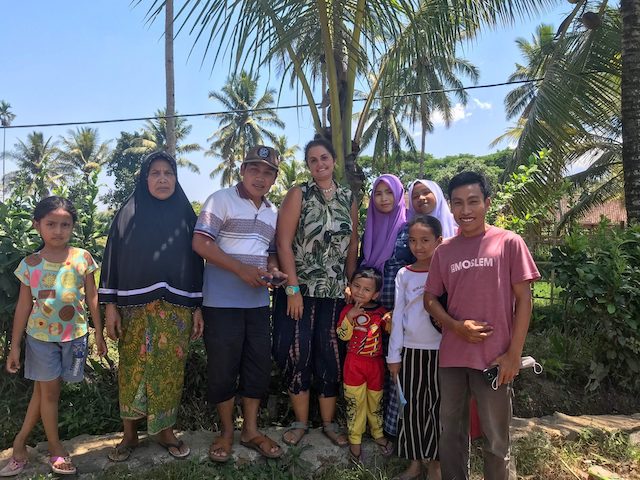
The author received a complimentary stay at Duara Travels’ East Lombok Homestay. All opinions are her own.








